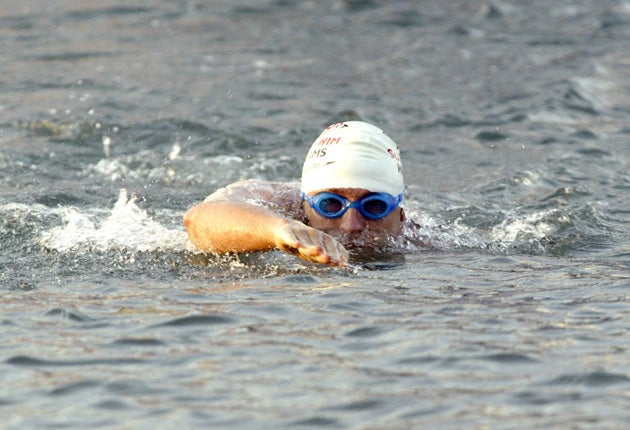French call for ban on Channel swimming

Armed with little more than a bathing suit, nose plugs and a liberal application of Vaseline, hundreds of cross-Channel swimmers have sought out one of sport's toughest challenge since Captain Matthew Webb first performed the feat in 1875.
More than 1,200 hardy souls have journeyed from all over the world to make the 21-mile crossing between Dover and Cap Gris Nez, near Calais, braving exhaustion, chafing and 100,000-ton container ships in order to achieve their dream. Many more have failed.
Now growing concern over safety and fears of mounting numbers attempting the challenge has led some to call for stricter rules on cross- Channel swimming.
A coalition of ferry operators and the Maritime and Coastguard Agency (MCA) urged greater regulation of swimming in the world's busiest shipping lane, which they said was "like trying to cross the M25 on foot". The call came after the deputy director of the French Coastguard, Jean-Christophe Burvingt, said he was in favour of a complete ban.
France outlawed swimmers setting off from its shores to Dover 17 years ago. In an interview with the BBC Mr Burvingt said it was only a matter of time before someone was badly hurt in the busy stretch of water used by 500 vessels each day. He said: "This continuous increase of swimming in the Channel creates a danger which is getting more and more important every year. I think that there will be a collision. There will be an accident."
The organisations claim there has been an explosion in the number of people attempting to swim the Channel since the successful crossing by the Little Britain star, David Walliams, for Comic Relief in 2006 in an impressive 10 hours and 34 minutes.
But representatives of the sport say numbers have not grown and that the swim is already highly regulated. Michael Oram, the honourary secretary of the Channel Swimming and Piloting Federation who has been piloting swimmers for the past 30 years, said safety measures were already highly effective.
Mr Oram said: "We are one of the safest extreme endurance sports going. There have been four deaths with the official swims since 1875 and these were heart attacks and problems like that. In 1953 one man couldn't afford an escort boat and towed a rubber ring behind him and was never seen again. You can get four deaths in the London Marathon or 11-15 a year on Everest." He said the number of people crossing was already controlled by a voluntary agreement limiting the number of escort boats operated by the two cross-Channel swimming associations. All swimmers must charter to comply with rules. Mr Oram said the number of crossings had remained static for the past four years at about 250, many of them completed for charity, and that the boats, which cost £2,250 to hire, were fully booked until 2014.
Tide and weather meant there were only about 30 possible crossing days a year in the season between June and October, while technology enabled pilots to spot approaching vessels from up to 20 miles away. "Imagine if the government decided that only 32-ton juggernauts could drive on the M25 – there would be an uproar," Mr Oram said.
Brian Rees, of P&O Ferries, which operates 46 daily crossings, said it was time to hold an open debate on the subject. He said: "It would be a desperately sad day if the UK tried to follow the French but it is the growing number of attempts that is starting to raise concerns. What increasingly worries us is the number of swimmers who go off on a single day."
Chris Newey, passenger director of DFDS Seaways, which operates ships between Dover and Dunkirk, said there was nothing to stop new organisations setting up to take swimmers across. He said: "We do not want to pour cold water on what can be a fundraising activity. However, our first and foremost priority is the health and safety and welfare of those at sea. We are concerned these crossings are unregulated and growing at an expedient rate."
Join our commenting forum
Join thought-provoking conversations, follow other Independent readers and see their replies
Comments
Bookmark popover
Removed from bookmarks